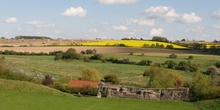Agriculture & Land Management
Our Work
Latest in Agriculture & Land Management
-

Towards sustainability: Future policies for European livestock
The CAP is failing to reward adequately those livestock farmers who produce public goods. Brexit and CAP reform are opportunities to do better.
-
Are Ecological Focus Areas delivering for biodiversity?
Ecological Focus Areas are intended to safeguard and improve biodiversity on arable farms in the EU. What evidence is there that they are actually delivering biodiversity on farmland?
-
Ecological Focus Areas – what are their impacts on biodiversity?
Ecological Focus Areas are intended to safeguard and improve biodiversity on arable farms in the EU. This IEEP study for EEB and BirdLife examined the evidence for potential biodiversity impacts on farmland, taking into account how the areas are being managed.
-
Biofrontiers – sustainability critical to the development of advanced biofuels
Adherence to effective and workable sustainability criteria is an essential requirement when using public support to incentivise advanced alternative fuels.
-
Understanding the consequences of changing biomass demand for energy
Understanding the consequences of increased biomass demand for energy on the environment is central to the development of future policy on renewable energy in Europe. This study seeks to help answer this need by modelling different levels of biomass demand for energy and the consequences for land use and forest based industries.
-
New report: delivering low carbon transport fuels post 2020
How should EU policy support the transition to low carbon transport fuels post 2020? A new IEEP led report argues that future policies should be differentiated to tailor support towards specific objectives and technologies that offer the greatest potential for a low carbon future.
-
New report is out: delivering low carbon transport fuels post 2020
How should EU policy support the transition to low carbon transport fuels post 2020? A new IEEP led report argues that future policies should be differentiated to tailor support towards specific objectives and technologies that offer the greatest potential for a low carbon future.
-
How to stimulate a bio-economy based on waste? – A study for the UK Government
Waste resources have the potential to provide a core component of developing bio-economies across the globe. A new IEEP report reviews how waste has been incorporated into existing bio-economy strategies, and the conditions that have enabled this.
-
The Manual: Chapter 1 - Policy framework
This is a chapter of IEEP’s Manual of European Environmental Policy. In this chapter, the reader is introduced to European environmental policy, EU institutions and agencies, and the development of EU treaties.
-
Guidelines for biodiversity proofing the EU budget
This report provides a practical framework to ensure that spending under the EU budget has no negative impacts on biodiversity, and that spending under the EU budget is overall supportive to achieving the biodiversity targets.
-
Sustainable intensification of European agriculture
The concept of sustainable intensification has come into prominence in the context of global food security. This report defines what we mean by sustainable intensification, explains its global logic, discusses what it means for EU agriculture and exemplifies this in three case studies for soil performance, nutrient recycling and biodiversity.
-
Sectoral resource mobilisation to implement global biodiversity targets
There is an urgent need to find sufficient resources to enable developing countries to implement the global targets for biodiversity by 2020. Financing the conservation and sustainable use of biodiversity from different sectoral funding flows can complement global biodiversity financing.
-
Land as an Environmental Resource
How can we meet the different and often conflicting demands we make on our limited supply of rural land in Europe? A more strategic approach to the way in which land is used is needed than has been the case in the past. This report for DG Environment looks at the data, the challenges and the policy options for Europe.
-
Biodiversity proofing of the EU budget
This study shows how more can be done to firstly avoid and minimize detrimental impacts of EU funding on biodiversity, and secondly to increase biodiversity benefits.
Related
-

Debating the Future of The Common Agricultural Policy
The IEEP's platform to share thoughtful commentary and analysis on the future development of European agriculture and rural development policy.
Highlights
-

Ecological Focus Areas – what are their impacts on biodiversity?
Ecological Focus Areas are intended to safeguard and improve biodiversity on arable farms in the EU. This IEEP study for EEB and BirdLife examined the evidence for potential biodiversity impacts on farmland, taking into account how the areas are being managed.
-

Understanding the consequences of changing biomass demand for energy
Understanding the consequences of increased biomass demand for energy on the environment is central to the development of future policy on renewable energy in Europe. This study seeks to help answer this need by modelling different levels of biomass demand for energy and the consequences for land use and forest based industries.
-

Land as an Environmental Resource
